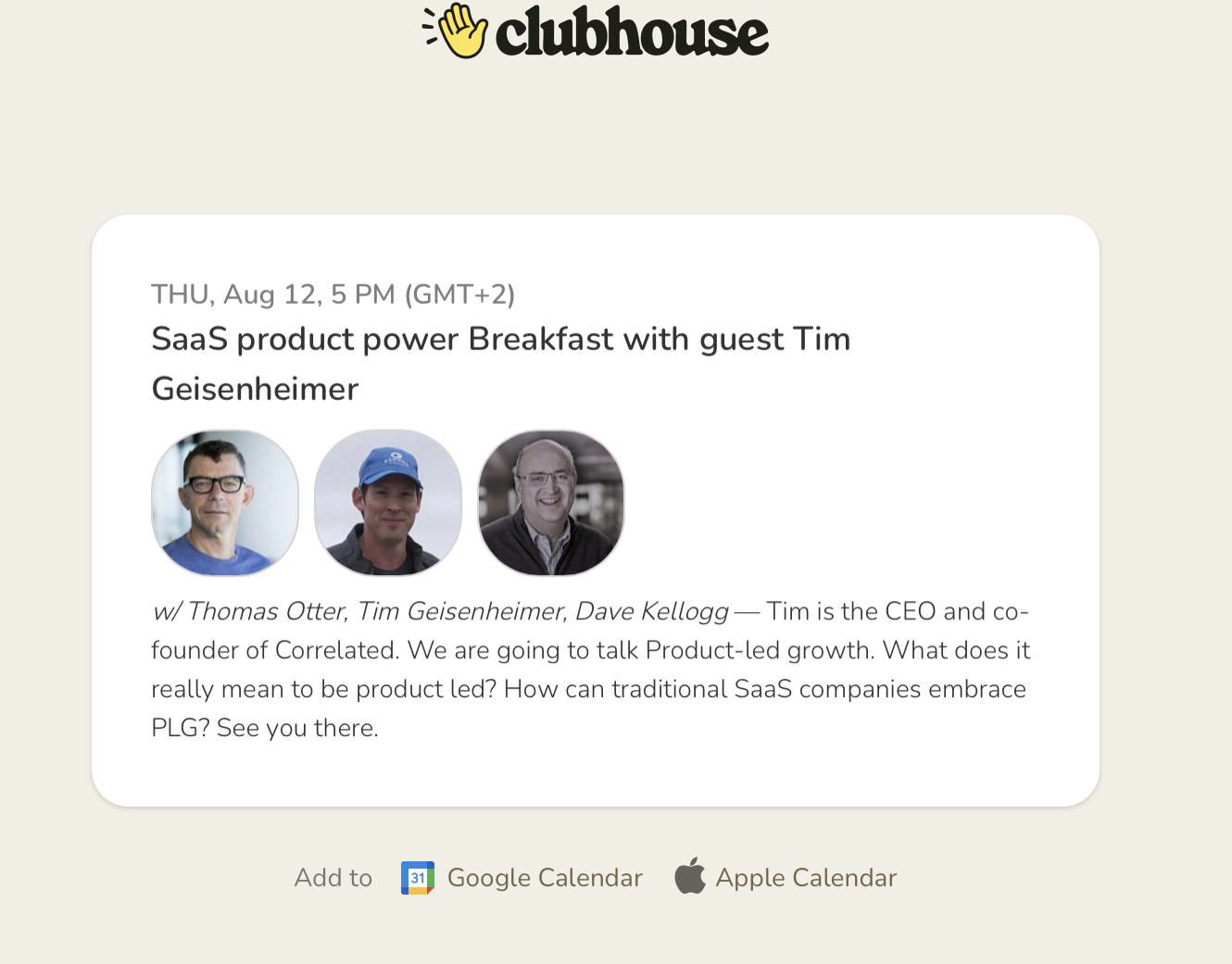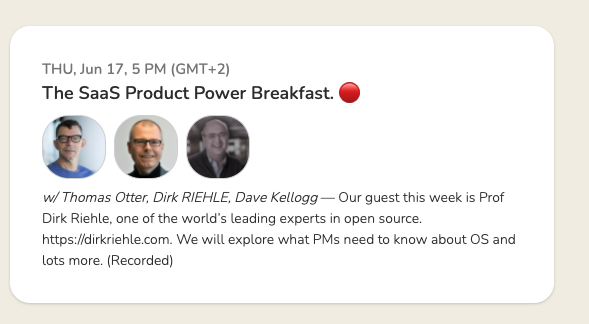HRTech
Product Management in Small vs Large Companies via SaaS Product Power Breakfast

In this episode of our SaaS Product Power Breakfast series, Dave Kellogg and I had a chat between the two of us. The topic of discussion: product management at large and small companies.
While we often feature a guest on our Clubhouse podcast, we sometimes interview each other and discuss subjects that we ourselves have quite a bit of experience in. For this episode, we picked the subject of Product Management. More specifically, we looked into 1) what the job of a product manager (PM) entails at a large vs a small company, and 2) what companies should look for when interviewing for this position.
You can listen to the podcast in full here. In the meantime, here is a summary:
- In large companies, the 'M' in PM is more important. In small companies/startups - the focus is on the 'P'. The big difference between the role of PM in large and small companies or startups is the main focus of their work. In larger companies, PMs' number one job is to manage – to manage people, teams, professional politics, deal with the upper-management, etc. It's not about crafting a product yourself but getting your team(s) to craft a product. Your success is largely determined by how well your team performs. Building a product through a proxy of other people is not so much an issue at startups or small companies. Here, the main goal of a PM is to actually craft a product by understanding the product-market fit. You don't have as much internal politics, red tapes, or large teams to manage. You are more directly involved in the product-creation process itself. It isn't easier, just different.
- Look for the perfect balance within your teams. Dave and I both agree that there is no golden ratio when it comes to the number of engineers or coders to the number of product developers. However, in my experience, what seemed to work well was the 1:3 ratio = 1 developer should be able to support the work of 3 sales execs. Dave looks at it from the density perspective, but his numbers are pretty close to mine. He believes that around 40% of people on the team should be coders/engineers. "If only 20% of people are writing code, you've got a problem."
- A PM's daily responsibilities differ greatly depending on the size of the company. From my own experience, I can say that a PM leader in a large company should try to start their day by catching up with people – your PMs. You try to spend time with them understanding their needs, the status of their work, etc. You also deal with other team heads – those leading the engineering team, for example. Then you have recruiting and constantly identifying any skill gaps or increased capacity needs. Much time is spent on communicating – communicating what you, as a team, are doing, why you are doing it, why certain things got prioritized vs others that got pushed down the list. You work with your sales team, supporting them on key deals. Finally, you constantly monitor how your product fits into the large hierarchy of products within your company. Managing the portfolio becomes a big deal.
As a PM in a small company or startup, there is a significantly larger admin burden. You don't need to worry about politics or the ability to get things approved by the higher-ups. If you have an issue, you should be able to resolve it on the spot with individual team members. You are more involved in the direct development of the product but, at the same time, you do not have the same admin support system, which means much of your day is spent figuring those things out yourself, from payroll to HR to purchasing your own laptop. - As a PM at a large company, focus on the WHY, not the HOW. I strongly believe that as a PM lead, one of your main jobs right from the start is to devise and clearly communicate the scope of responsibility and decision-making for your teams. You shouldn't be micro-managing your PMs. Instead, it's up to you to safeguard their decision-making – after all, you presumably hired them for their level of expertise, so you should trust that expertise and give them the freedom to make decisions.
- Prioritize future releases over current and past ones. When working at a large company, as a PM lead, I recommend that you don't spend much time on your previous releases and trying to unwind customer issues there. Focusing on current releases means you're probably micro-managing your PLs. As a PL leader, you should be spending more time on future releases – 2-3 things that you see coming down the line. Get ahead.
- Safeguard your team from rhinos and expect kangaroos. As a PL lead, it's your responsibility to protect your team's time. "Safeguarding them from rhinos" means being the gatekeeper of sorts of your engineers and PMs from other people in the company – say senior sales leaders – who push for product developments outside of the current scope of work. These are the distractions and it's your job to know when to say no to them.
Furthermore, you need to always prepare your team for kangaroos – a valid product requirement that you did not expect. Something that jumps at you, if you will. Where's the kangaroo going to be in the next release? - Subject matter expertise vs. PM skills. Of course, ideally, when hiring for the PM position, you'll find a candidate with both solid subject expertise AND excellent project management skills. However, how often does that happen! We believe, in general, the more complex a product and its requirements, the deeper the level of expertise you should look for in a candidate. For simple use cases with straight-forward goals, We'd focus on candidates with superior PM skills.
- Look for curiosity, above all else, in your candidates. One of the most important things that we advise others to look for in candidates for PM positions is their willingness to learn and curiosity. PM role is fluid, it requires consistently learning about the product, PM processes, team members, etc. Whoever you hire must display that commitment to continuous learning.
One other important element to look for is the ability to influence. When it comes to startups, the hierarchy is much less obvious. One of the worst questions a candidate can ask is how many direct reports they will have. A PM should be able to achieve collaboration and unite team members' vision through influence, not through a job title and a formal hierarchy. - An ideal PM for a startup has a mix of experiences. We don't recommend hiring a leader straight out of a large company with zero startup experience for the PM position, unless they show a deep understanding of the start up challenges. As explained earlier, the expectations of the job and the daily tasks differ greatly. So you ideally want someone with experience working at startups. However, large companies also provide valuable knowledge, experience, and connections – all of this will prove valuable to a startup, especially one that's at a scaling stage.
It was great, as always, to chat with Dave. Make sure to stay tuned for our next session of the SaaS Product Power Breakfast on Clubhouse and join in. We'd love for you to ask questions or share your thoughts during our podcast.
You can always find the recordings here.




